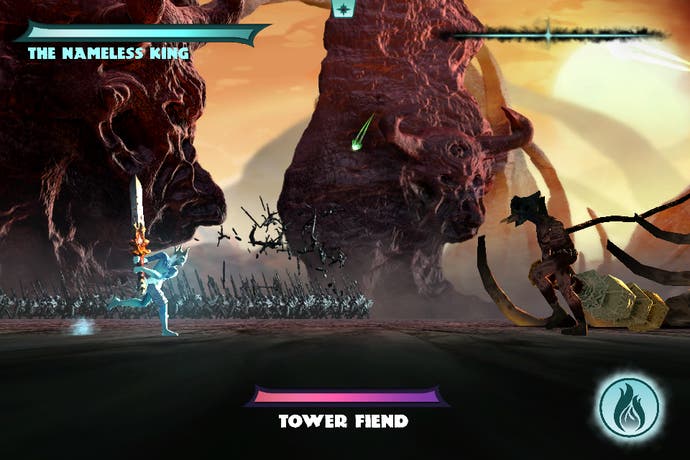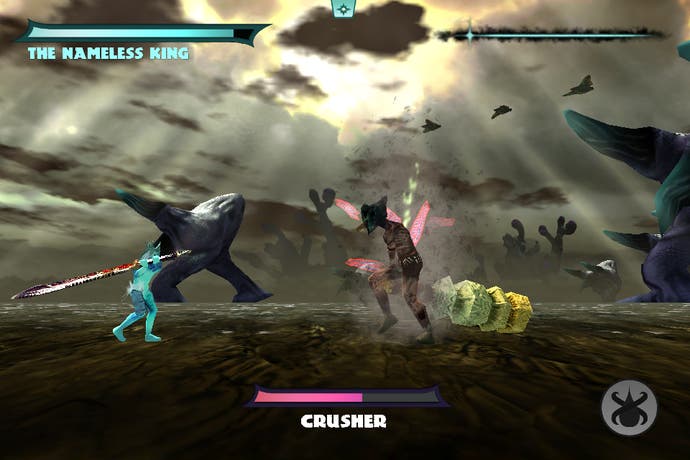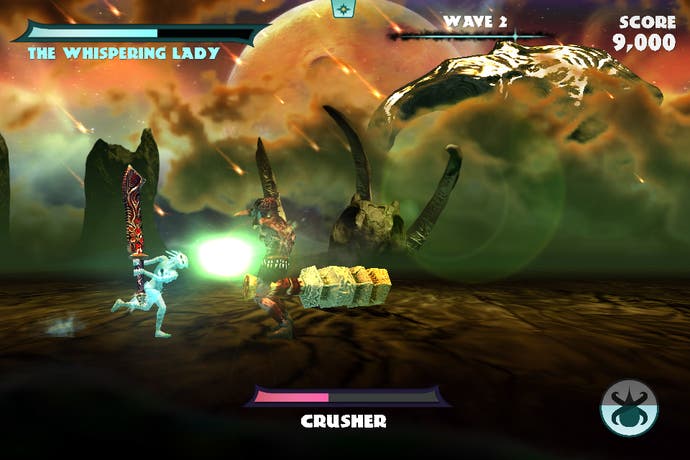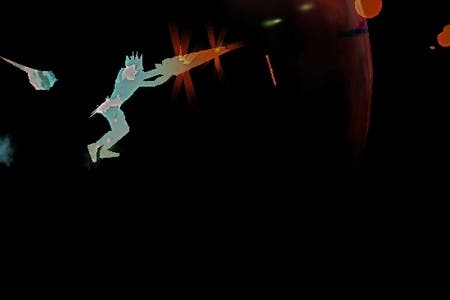Fighting with fantasy: The many stories of God of Blades
White Whale Games explains how its iOS debut emerged from a love of books.
"George, Jo and I met at a coffee shop one night about two years ago when George noticed me drawing a Sasquatch on my laptop."
How do video game start-ups initially get together? Conferences? Publisher lunchrooms? Craigslist? Not always. Why bother with any of that stuff when you've got the coffee shop/Sasquatch option to exploit? White Whale Games may not have the most traditional origin story, perhaps, but it feels strangely appropriate all the same.
"I was working at BioWare at the time, and George Royer and Jo Lammert were at the School of Information at the University of Texas, pursuing a Ph.D. and masters degree, respectively," continues Jason Rosenstock, the developer's creative director. "Our friendship grew out of our love of strange fantastical films, books, and games. When my contract at BioWare was up, it wasn't too long before we decided to try to spend the summer doing a little game project for fun. That snowballed."
It snowballed into God of Blades, an iOS auto-runner that doesn't really feel like any other iOS auto-runner yet made. Instead, it comes across as an artefact from an alternate 1970s: a blend of pulp fantasy novels and bizarre-o prog rock album art, set to the numinous thrumming of early synths. With its oily star-scapes, its boiling winds and its freakish lumps of stone strung across the horizon, it's almost oppressively atmospheric. Moody, complex and hinting at buried depths, the muddle of old paperbacks and record sleeves provides the perfect backdrop for a wonderfully pared-back arcade game that sends the Nameless King racing ceaselessly into battle, parrying and striking with a series of magical swords.

Context rarely matters very much when it comes to the streamlined world of iOS timewasters. For God of Blades, however, it's utterly essential to the appeal of the project; the game literally emerged from the landscape, in fact. "My first few weeks after leaving BioWare were tough," admits Rosenstock. "So when I faced all this free time I just started to build out game environments for fun. One of them was this sort of misty, primeval side-scrolling idea. George and I had already been talking about what we loved about Robert E Howard, primal fantasy stuff, and that eventually grew into our love of pulp, strange old music and film, the aesthetics of the 60s and 70s in fantasy and, of course, old paperbacks. Old paperbacks and psychedelic imagery became our big aesthetic go-to, and soon we were designing this really simple side-scrolling swordfighter. It was all very rock-paper-scissors. We wanted something easy to program."
"There's a good reason the main characters are ghosts," chips in Royer, the lead designer. "For me, the game is about hauntings. We're haunted by lost styles and missing pieces of media from our past. It's sort of about the price of memory, and looking at what it means to hang on viciously to a style, an era, or a mood. I wanted to boil that down. The Nameless King and the Whispering Lady are long dead, and they don't belong in that world anymore, but they come back. The thing is, when they come back, they're just driven to repeat the kinds of actions they made in life even though they don't really have the cognitive capacity to fully understand what they're doing. They're killer echoes. So, I was trying to communicate on some level that moving forever, only interacting violently and being unable to choose a different path was, in this case, as in the case of many side-scrollers, a kind of structural imposing of a form of damnation. The characters haunt a weird landscape that they only vaguely perceive because they're from another time, like a record stuck on a loop."
With the addition of a programmer, Adrian Lopez-Mobilia, who is now the fledgling studio's tech director, the dead worlds of God of Blades received a welcome embellishment: physics. Useful and dangerous in equal measure, physics brings an unexpected playfulness to such an ominous game. Knock an enemy back, and they'll pinwheel sleepily through the air, possibly doing some damage to the next enemy you face, but potentially only adding another layer of complication.
"The physics went through multiple iterations," says Lopez-Mobilia. "At first, it was honestly just the cheapest option we had. We couldn't afford lots of animations so we decided to go with ragdolls and characters flailing dynamically. From there, we realized that we could really exploit the power of the devices, and decided to push them toward having physics affect the actual gameplay as well. It was not at all trivial to get right. We first needed to get an idea of how far we could take everything and still have the world be in your control, which in the end required lots of tweaking and cheating. As timing strikes is the most important aspect of the gameplay, we had to make the swords much heavier than anything else in the world so that they wouldn't be knocked around randomly. We also had to alter the weight of the ragdolls to produce results that were not actually physically correct. Characters heads are proportionally heavier than the rest of their bodies, for example, which we found created much more interesting collisions."

At heart, the game's still driven by atmosphere, though: by the melancholic trials of the Nameless King, and by the imaginary paperback novels that provide God of Blades with the basis for its chapters. It's a delicate balance, really: White Whale had to suggest a depth of imaginary fantasy literature that the game is tapping into, without boring the player with too much detail.
"We have a deep love for this aesthetic," says Rosenstock, "and the last thing we wanted was to convey a shallow, kitschy, hip sort of feeling about it. Finding old paperbacks or strange records in a library or someone's attic really changed our lives, and we wanted to talk about the way that that kind of discovery is changing as our media consumption becomes more digital. We knew that inserting a really heavy, detailed fantasy narrative into this type of game would be meaningless unless it carried that larger theme. The pulpy, 70's fantasy style was the perfect carrier of that message.
"As we explored that style more and more, it became ingrained into every aspect of the game," he continues. "As the primary artist, I always had to keep myself in check by staring at old book covers to make sure I wasn't losing the strange colour combinations. I even started squishing paint between Plexiglass, photographing it, and blending it into all of the art to get a consistent grainy, trippy look. In the design we didn't want the combat to feel like any other game, we wanted it to feel like the descriptions of combat from someone like Robert E Howard or Michael Moorcock. Swordsmen in God of Blades aren't doing any fancy martial arts, nor are they engaged in historically realistic combat. Instead their swords are slicing in wide, grand arcs, and the blades feel alive when they clash, break or crackle with magic. Fights are won with keen timing and bold dramatic choices. That's the combat that made me love pulp fantasy."
Not all of the books that power God of Blades are necessarily imaginary, of course. Take the game to a local library and fire it up, and you'll be able to unlock new blades using Loreseeker, a feature that makes clever use of Foursquare. Paul Auster once said that if you carry a pen and paper around in your pocket long enough, you'll eventually start writing. (You might also sit on it and do yourself an injury, of course.) Is White Whale trying to pass on its love of books in a similar manner? Is there a little social engineering at work here?

"Loreseeker is a kind of design intervention to encourage people to be proactive about finding amazing things in their lives," admits Royer. "I imagined that Loreseeker might prove controversial, but very early in the design process we said no to day one in-app purchases and wanted to come up with something more interesting. I decided that because we're talking about lost things, lost stories, lost memories, and using books as a way to get at that, it would be really cool to make trying to track those things down part of the game experience.
"Things are so easy to get now: pay, download, done," he says. "I wanted something that made me feel the way I did when I was a kid, scrounging around for records to listen to, discovering old mixtapes, wandering the stacks in the library. Weird buildings full of secret stuff. I just wanted to kind of put a little mystery and magic back into the regular world. Kind of like it was when I was growing up in a town where there wasn't much else to do besides go to the weird section of the library and find crazy stuff. Those formative years inspired God of Blades and I owe a lot of who I am to the music, film, and books I found then. But I had to dig for them, and that made them mean something even more to me."
It's paying off too. "The other day, we were emailed by an Australian library," Royer concludes. "They'd found our game and were super excited to begin using it as a way to reach out to their younger patrons. We were so excited, too. You can't get kids started on swords and sorcery early enough."
God of Blades is available for iPad and iPhone, priced at £1.99. You can pick it up here.









